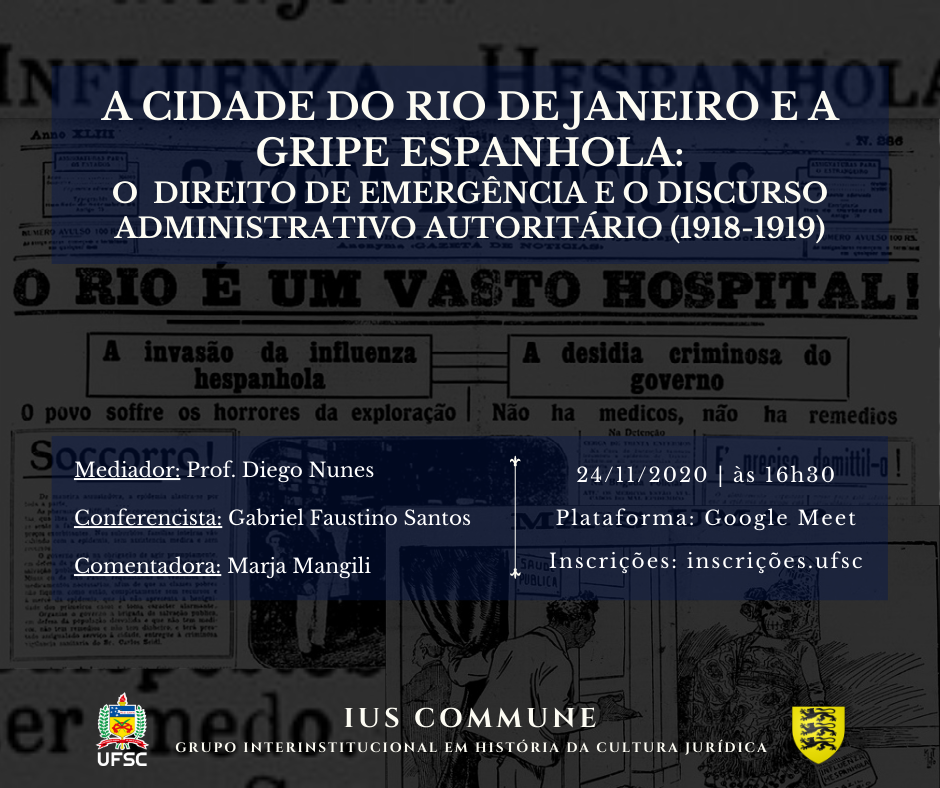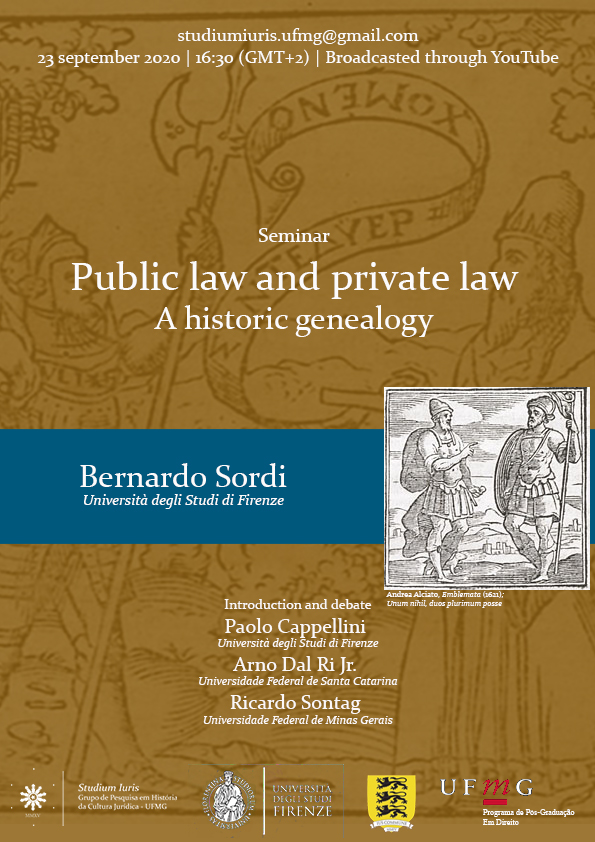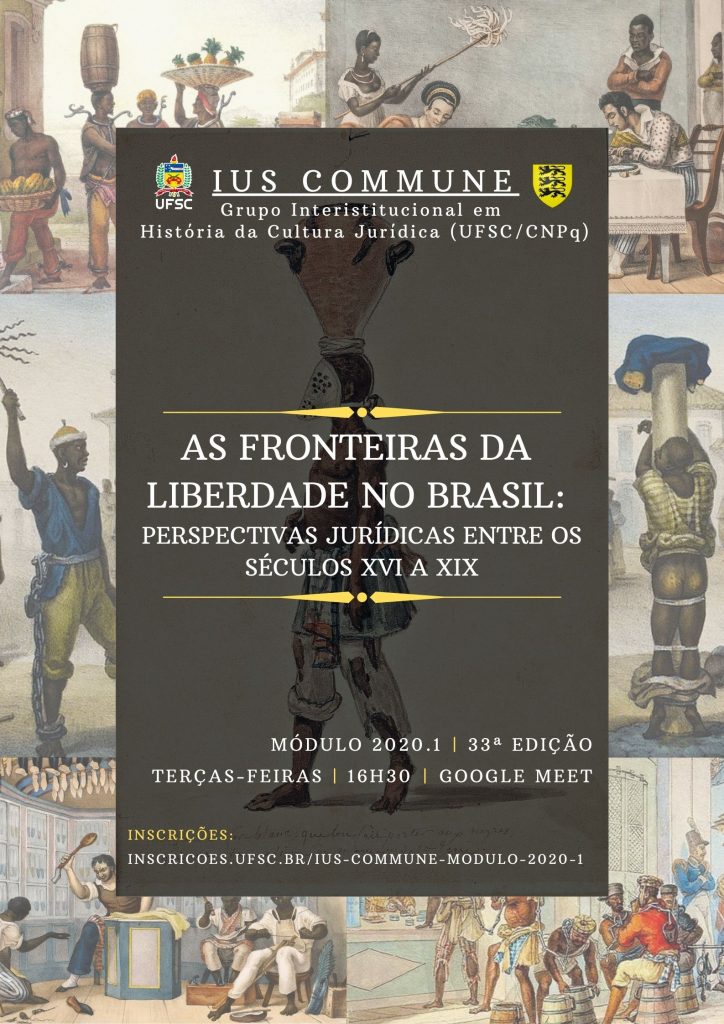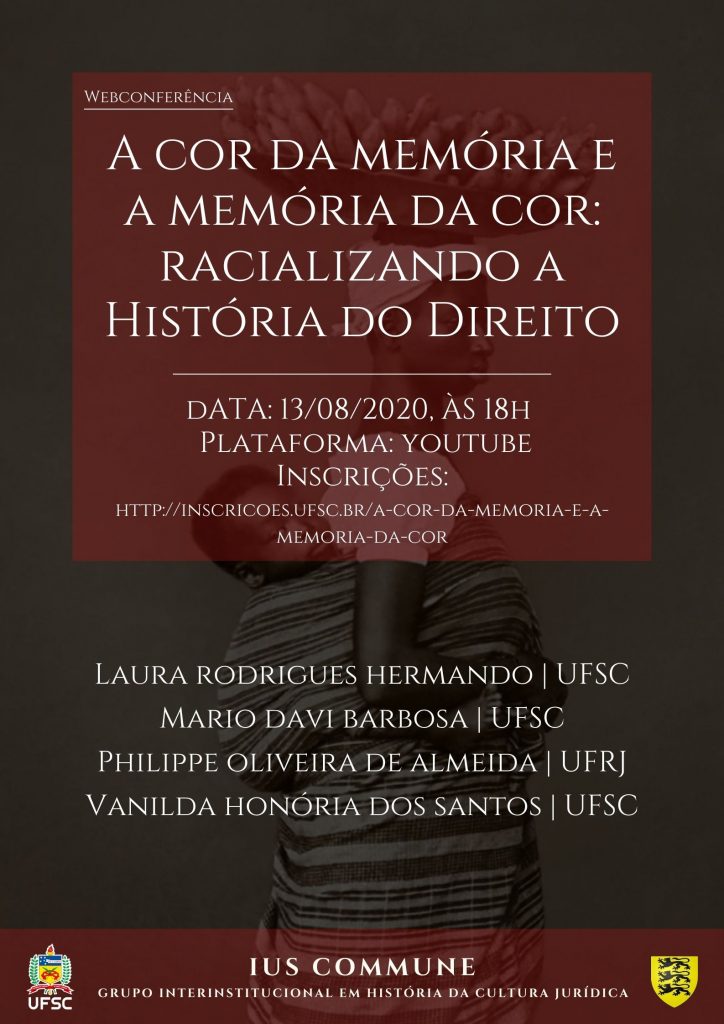-
STORIES ABOUT WHO WE ARE: reflections on the History of Law and the History of Philosophy

When: 01/12, Tuesday, 14h – 15h30
Where: Google Meet platform (link will be emailed to subscribers)
Subscription Link: http://inscricoes.ufsc.br/historias-sobre-quem-somos
What is the status of a discipline that deals with the history of a consolidated area of research? In this discussion, we intend to deal with two particular cases of this general issue: the History of Philosophy and the History of Law.
Each of the two cases has salient peculiarities: for example, the History of Philosophy is a discipline consecrated in the curricula of philosophy courses, it is a field that is part of the expertise expected of a professional philosopher and, for part of the philosophical community, is the philosophical exercise par excellence (and, in the most extreme versions of the thesis, the only possible). On the other hand, the History of Law occupies a very different position: it is not, at least in Brazil, a consolidated part of curricula and the object of systematic investigation and bibliographic production that confronts a history of naïve law that is sometimes told despite the lack of evidence in its favor and a critical look capable of identifying elements of social power that this naïve version creates and consolidates.
In this sense, this round table aims to explore some specific difficulties of each area. In favor of a History of Law, Professor Diego Nunes intends to discuss theoretical difficulties for the establishment of a community of law historians who guide their investigations using consolidated tools of search and organization of historical evidence, moving away from a “pseudo-scholarly baccalaureate” that infiltrates the naïve version.
Alternatively, given the place of the History of Philosophy in the Brazilian philosophical tradition, Professor Alexandre Meyer Luz intends to discuss difficulties for the consolidation of a philosophical tradition centered on problems as an alternative to the place of honor often attributed to historiographic work.
Despite the differences between the subareas, the authors intend to suggest that there are many common points that deserve joint attention: epistemological issues, such as the question about the status of subareas as potential producers of knowledge; questions about the symbolic power that the sub-areas carry and distribute, etc.
Therefore, with the aim of creating a space for exploring these common issues.
All invited!
-
Webconference | THE CITY OF RIO DE JANEIRO AND THE SPANISH FLU: the right of emergency and the authoritarian administrative discourse (1918-1919)

Epidemic diseases, throughout history, have been transpassed through by political and social factors, affecting different groups of people and enabling a range of responses. Historically, epidemics and ideologies spread in the same way, providing the emergence of social conflicts and resistance to interventionism and attempts to medicalize society.
The classification of a state as a disease is not a socially neutral process, and in health administration it becomes a fine line between legitimacy and stigma. At the same time, the impact caused by epidemic disease on society could become a factor of legitimization of government intervention, through legislation that would establish a form of social control, reformulating the relationships between individuals and between individuals and institutions.
In this sense, Ius Commune presents the webconference “THE CITY OF RIO DE JANEIRO AND THE SPANISH FLU: the right of emergency and the authoritarian administrative discourse (1918-1919)”, to be held next Tuesday, 24/11, at 16:30, by the Google Meet platform. The web conference will be recorded and made available on our Youtube channel. Participation in the webconference grants 2h certificate/class. The link to participate will be sent to subscribers. It will be attended by Gabriel Faustino Santos, as a lecturer; Marja Mangili, as a commentator; and Professor Diego Nunes, as mediator.
Subscription link: http://inscricoes.ufsc.br/a-cidade-do-rj-e-a-gripe-espanhola
Our lecturer, Gabriel Faustino Santos, holds a law degree from the Federal University of Uberlândia, completed in 2014. He holds a Master’s degree in Law from the Federal University of Uberlândia, completed in March 2018. He is currently a doctoral student enrolled in the third year of the Corso di Dottorato in Scienze Giuridiche, Curriculum Storia and Teoria del Diritto, Ciclo XXXIV, Università Degli Studi di Macerata.
Our commentator, Marja Mangili was graduated in 2015 in Law from the Federal University of Santa Catarina. She holds a Master’s degree in Theory and History of Law from the Graduate Program in Law from the Federal University of Santa Catarina (UFSC) in 2017. She has been a doctoral student since 2017 in the area of Law, State and Society by the Post-Graduation Program in Law (PPGD). Research on the concept of legal interpretation during the First Republic from the perspective of Theory and History of Law. Member of the research group Ius Commune.
Finally, our mediator, Professor Diego Nunes, has experience in the area of History of Law, with emphasis on History of Criminal Law and Criminal Justice and Constitutional History, acting mainly on the following topics: political crimes and national security, Criminal Law in authoritarian states, courts of exception, relations between codifications and extravagant laws, extradition and international defense against crime. Currently the professor has posted several videos for the series “History of Criminal Law on video” on his YouTube channel, with the aim of presenting the various stages of criminal justice and criminal law throughout history, through videos recorded by experts in the area that present syntheses about a certain historical period. It’s worth checking out!
We count on the presence of all and until then!
-
Contemporary Histories of Law

On 14 October 2020, Wednesday, at 11:30 am (Brasília time), the Studium Iuris – Research Group on the History of Legal Culture (UFMG), in collaboration with the Ius Commune – Research Group on the History of Legal Culture (UFSC), will promote a conference with Professor Jean-Louis Halpérin (École Normale Supérieure – Paris), in which he will discuss his recent book “Histoires Contemporaines du Droit”, written in co-authorship with Anne-Sophie Chambost and Frédéric Audren.
The conference will be held in English.
The conference will be broadcast via YouTube: https://www.youtube.com/channel/UCUFoIR7kgWpf2VgK3NtsaZg
Subscription Link (non-compulsory): https://docs.google.com/…/1uTI4PpXjGprF5wYEyHfUkpSESXuV…
On the day of the event, a virtual form will be made available to listeners who wish to send questions to be discussed during the conference.
The book “Histoires Contemporaines du Droit” (“Contemporary Histories of Law”) outlines a wide and up-to-date range of methodological possibilities for making legal history of the 19th and 20th centuries. The authors propose a critical overview of the discipline, encouraging historians to view legal actors, norms, and activities through the prism of controversy, interdisciplinarity, and global legal history.
-
Seminar Public Law and Private Law: a historic genealogy

Prof. Bernardo Sordi will discuss on wednesday, 23 September his new book Diritto pubblico e diritto privato. Una genealogia storica (Bologna, Il Mulino, 2020). The webinar will be held in partnership between Studium Iuris – Research Group on History of Legal Culture (UFMG), Ius Commune – Research Group on History of Legal Culture (UFSC) and Università di Firenze (phD School in Legal Sciences, curriculum Theory and History of Law).
The conference will be held in English.
Time: 11:30 (Brazil); 16:30 (Italy)
The conference will be broadcasted through YouTube in this link: https://www.youtube.com/channel/UCUFoIR7kgWpf2VgK3NtsaZg
Subscription Link (non mandatory): https://docs.google.com/…/1vvyH1v0oaqhwgii…
The questions during the conference shall be made through a form, which will be made avaliable during the event.
“From the point of view of jurists, public and private are ancient words, but the long itinerary that announces this great dichotomy starts only with the arrival of the modern state, which shapes public law, at the same time as private law is captured by the orbit of legal individualism. With the demise of the ancient regime, the dichotomy will be turned into the foundation of the entire legal system, embodying the typically nineteenth-century balance between state and society, sovereignty and rights; the twentieth century, on the other hand, will disrupt these boundaries, introducing compromises and mixtures between state and economic, social and individual, general interest and special interests. In more recent years, the intensity of economic globalization and the impoverishment of constitutional programs suggest a new primacy of private law. In the perspective of a renewed unity of the legal system, this book investigates the relationship between the ‘two laws’ in their stratified historicity, inviting us to reflect on the need for a reasonable balance between personal and collective needs, rights and duties, guarantees and powers”.
-
33rd Edition | Module 2020.1 – The Frontiers of Freedom in Brazil: legal perspectives between the 16th to 19th centuries

The Ius Commune – Interinstitutional Group on The History of Legal Culture – UFSC/CNPq, coordinated by Professors Ds.Sc. Arno Dal Ri Jr., Caetano Dias Corrêa and Diego Nunes invites the entire academic community to participate in the 33rd module of discussions entitled “The Frontiers of Freedom in Brazil: legal perspectives between the 16th and 19th centuries”.
Slavery, a phenomenon closely linked to the process of formation of Brazilian society, had to be coated with legal legitimacy that supported in the theoretical level the domain of one over the other and the restriction of freedom, this from legal forms and institutes that were being applied, interpreted and re-meant by jurists until its extinction.
The objective of the module is, therefore, to discuss the various ways of looking at this phenomenon from the discussion about freedom and its legal boundaries, demonstrating how historical individuals had to deal with and experience slave experiences, whose great challenge was to establish the limits between what it meant to be free or not and consequently to envision the precariousness of the free being and the challenges of seeking the recognition of freedom as a right.
It is expected to read the basic and complementary texts available in advance. To access the bibliography, just click on this link and access our Drive:
https://drive.google.com/drive/folders/1vODEuCAN_QYRs9EpdAGQdVNpvErqExgZ?usp=sharing
A certificate of participation will be granted with 20h for those who participate in 75% of the meetings of the study group (participate in at least 6 meetings). The opening meeting of the module will be on 22/09, at 16:30 and other meetings will continue to take place weekly, on Tuesdays, at the same time. Registration can be made by the form available at this link: http://inscricoes.ufsc.br/ius-commune-modulo-2020-1
The event will take place via Google Meet and the room link will be sent by email to subscribers. We count on the participation of all! Until then!
MEETING AND READING SCHEDULE
1st Meeting – 09/22/20 – Presentation of the theme of study, calendar of meetings and division of texts and rapporteurs.
2nd Meeting – 09/29/20 – Slavery and its legal form.
Base text: Direito das pessoas; Escravos. In: HESPANHA, Antônio Manuel. Como os juristas viam o mundo: 1550-1750. p. 203-220.
Historical source: Copus Iuris Civilis (Digesto). Ulpiano. Instituições, Livro I (pp. 24/25).
Complementary Text: GRINBER, Keila et alli. Escravidão, liberdade e direito no Atlântico escravista (Capítulo 1, pp 7-24). In: GRINBER, Keila et alli. Escravidão e liberdade nas Américas. Rio de Janeiro: FGV, 2013.
3rd Meeting – 10/06/20 – The question of the enslavement of the Indians: the indigenous condition in Dutch Brazil.
Base text: VAINFAS, Ronaldo. O plano para o bom governo dos índios: um jesuíta a serviço da evangelização no Brasil Holandês. In: Clio – Série Revista de Pesquisa Histórica – N. 27-2, 2009 (p. 145/162).
Historical source: Revista do Instituto Archeológico e Geographico Pernanbucano. Sessão Especial de 9 de maio de 1886. Recife: Tipologia Industrial, 1886.
Complementary Text: BOXER, G R. Os Holandeses no Brasil (1624-1654). Edição Ilustrada. Brasiliana (Volume 32);
RIBAS, Maria Aparecida de Araújo Barreto. O leme espiritual do navio mercante: A missionação calvinista no Brasil holandês (1630-1645). Tese de douturado. Niterói, UFF, 2007.
4th Meeting – 10/13/20 – The enslavement of blacks and their justifications.
Base text: HESPANHA, Antônio Manuel. Luís de Molina e a escravização dos negros. In:Análise social, vol. XXXV (157), p. 937-960.
Historical source: Aristóteles. Política. I, 4 (A servidão natural; A servidão convencional).
5th Meeting – 10/20/20 – Precarious freedom: the 17th century. XIX and its impasses
Base text: LIMA, Henrique Espada. Sob o domínio da precariedade: escravidão e os significados da liberdade de trabalho no século XIX. In: Topoi, v. 6, n. 11, jul-dez 2005, pp 289-326.
Historical source: FONSECA, Francisco Xavier Dias. Recibo de venda de um escravo. 15/12/1858; ALENCAR, José Martiniano de. Carta de Alforria. 1855; LIMA, Francisco Xavier Pinto. Matrícula de escravo. 09/07/1872.
Available in the Brazilian Slave Trade section of the National Library: http://bndigital.bn.br/projetos/escravos/galeriamanuscritos.html
Complementary Text: GRINBERG, Keila. Senhores sem escravos: a propósito das ações de escravidão no Brasil Imperial. Almanack Braziliense, v. 6, p. 01, 2007.
6th Meeting – 10/27/20 – Freedom and illusions: illegal trafficking and the issue of free Africans
Base text: MAMIGONIAN, Beatriz Gallotti. Os direitos dos libertos africanos no Brasil oitocentista: entre razões de direito e considerações políticas. In: História (São Paulo) v.34, n.2, p. 181-205, jul./dez. 2015 ISSN 1980-4369.
Historical source: Lei de 7 de novembro de 1831 (Lei Feijó); Lei nº 581, de 4 de setembro de 1850 (Lei Euzébio de Queiroz). Art 179 do Código Criminal do Império do Brazil.
Complementary Text: SÁ, Gabriela Barretto de. Capítulo 2: O Contexto do texto: O crime de reduzir pessoa livre à escravidão no Código Criminal do Império do Brasil. In: O crime de reduzir pessoas livres à escravidão nas Casas de Morada de Justiça no Rio Grande do Sul (1835-1874) Dissertação de Mestrado. UFSC/CCJ/PPGD. 2014.
7th Meeting – 11/03/20 – The “actions of freedom”: the meanings of living on one another and the borders of slavery.
Base text: CHALHOUB, Sidney. Visões da liberdade: uma história das últimas décadas da escravidão na Corte. São Paulo: Companhia das Letras: 2011 (p. 116-161 (Capítulo 2 – Visões da liberdade).
Historical source: Lei Imperial nº 2.040, de 28 de setembro de 1871 (Ventre Livre); Lei Imperial nº 3.270, de 28 de setembro de 1885 (Sexagenários).
Complementary Text: FERREIRA, Daniel Carvalho. Sob a liberdade: condições socio-históricas de possibilidade do alargamento do “espaço de possíveis” na Corte Imperial. In: O Juízo dos Libertos: Bacharéis da Corte, escravidão e campo jurídico no segundo reinado (1850-1871). Dissertação de Mestrado. Belo Horinzonte: UFMG.
8th Meeting – 11/10/20 – Beyond abolition: debate on the ruptures and continuities of slavery in the twentieth century.
Base text: PINTO, Ana Flavia Magalhães. Raça, abolicionismos e cidadania nos anos de 1880 (Capítulo 6, pp 187/220). In: Fortes laços e linhas rotas: Literatos negros, racismo e cidadania na segunda metade do século XIX. Tese de doutorado. Campinas, UNICAMP, 2014.
Historical source: Lei Imperial nº3.353 de 13 de maio de 1.888.
Complementary Text: GATO, Matheus. “Ninguém quer ser um treze de maio”: Abolição, raça e identidade nacional nos contos de Astolfo Marques (1903-1907). In: Novos Estudos. CEBRAP, São Paulo, V 37, N 01, JAN/ABR 2018, pp 117/140.
-
Citizenship, Nationality and Identity

On August 18, at 16h00, will be held round table with the international participation of the Italian sociologist Dr.S. Renzo M. Grosselli, professor Dr.S. Arno Dal Ri Jr., ufsc, and master’s student Andrey José Taffner Fraga, also of UFSC, to discuss issues pertaining to Italian nationality, at the age of twenty years of Law 379/00 (which recognized the right to Italian nationality to people born in the annexed territories of the Hungarian Austro empire and their descendants), as well as the identity of italian tiroleses in Brazil.
The organization of the event involves the research groups “Ius Gentium” and “Ius Commune”, both from the Federal University of Santa Catarina, and the broadcast will be carried out through the channel “Ius Gentium UFSC”, on You Tube.
At the time, participants will be able to interact by sending questions to the debaters. Subscription can be done through the following link:
https://docs.google.com/forms/d/e/1FAIpQLScOzk8333Am6AMqQ3u9IDhWiMt_vAicJuKa5oZ8_M21yKTeA/viewform.
On the day of the event, a second form will be made available for those who wish to confirm attendance and receive a 2-hour certificate of extension activity.
-
Webconference – The Color of Memory and the Memory of Color: Racializing the History of Law

An interesting excerpt draws attention in the book “Black Feminist Thinking” by Patricia Hill Collins. The thinker states that “suppressing the knowledge produced by any oppressed group facilitates the exercise of power by the dominant groups.” This shadow that invisibles the knowledge constructed by minority groups helps to make up the idea that there is no dissent and that the members of these communities collaborate for their own victimization.
Understanding the importance of this debate to the academic community, The Ius Commune, Interinstitutional Group of History of Legal Culture, coordinated by professors Doctors Arno Dal Ri Jr, Caetano Dias Corrêa and Diego Nunes, invites everyone to participate in the webconference entitled “The Color of Memory and the Memory of Color: Racializing the History of Law”, presented by Philippe Oliveira de Almeida, Vanilda Santos, Mario Davi Barbosa and Laura Rodrigues Hermando, on 13/08, at 18h, live on Youtube.
Philippe Oliveira de Almeida is professor of Philosophy of Law at the National Law School (Federal University of Rio de Janeiro). Currently, he has been researching the genesis and development of critical theories of “postmodern” law (such as Critical Legal Studies and Critical Race Theory), as well as their interlocution with utopian thinking (in the light of authors such as Karl Mannheim, Ernst Bloch and Paulo Ferreira da Cunha).
Vanilda Santos holds a doctoral student in Theory and History of Law from the Post-Graduation Program in Law (PPGD/UFSC). She develops research in history of law, quilombola’s territorial rights, legal pluralism and black brotherhoods, ethnic-racial relations from a legal perspective and reparation of slavery, working mainly with the right to truth and historical memory.
Mario Davi Barbosa holds a master’s degree in Theory and History of Law from PPGD/UFSC. He has experience in law, with emphasis on Public Law, working mainly on the following topics: justice systems, human rights, prison system, inequality and Law and Slavery.
Laura Rodrigues Hermando holds a law degree from the Federal University of Santa Catarina (UFSC). Appropriating the History of Law, with emphasis on Social History of Labor and Slavery, has been dedicated to studies on domestic work and child labor, as well as the connections of these themes with gender, race and class.
Subscription can be made through the link: http://inscricoes.ufsc.br/a-cor-da-memoria-e-a-memoria-da-cor
The Live link on Youtube will be sent to subscribers and made available on the group’s communication channels. Participation in the event will grant a 2h/class certificate to participants.
-
Special Module 2020: History of International Law

The Ius Commune – Interinstitutional Group on The History of Legal Culture – UFSC/CNPq, coordinated by Professors Drs.S. Arno Dal Ri Jr., Caetano Dias Corrêa and Diego Nunes, invites the entire academic community to participate in the Special Module 2020. This semester, the group includes the special module of discussions entitled “History of International Law” in order to analyze different angles of international law throughout history.
In our first meeting we will have a small presentation of the group and the appropriate instructions on its operation, followed by our first passage in the sixteenth century with the theme “Political Theology and Fair War in John Calvin”, presented by Professor Caetano Corrêa. Our second meeting permeates the 19th century with the theme “Nation and State in Pasquale Mancini”, presented by Professor Arno Dal Ri Jr. Finally, we closed the activities of the special module in our last stop in the twentieth century with the theme “Extradition and Political Crimes from the Italian-Brazilian Treaties”, presented by Professor Diego Nunes.
It is expected to read the basic and complementary texts available in advance. To access the bibliography, just click on this link and access our Drive. The activity is also recorded as extension, with 12 h. To obtain a certificate, you will need to register for up to the second meeting and have attended two of them live. The opening meeting of the module will be on 21/07, at 18h and two other meetings will continue to take place on Tuesdays, at the same time. Registration can be made by the form available at this link. The event will take place via Google Meet and the room link will be sent by email to subscribers. We count on the participation of all! The most important is the interaction of the participants, with questions and comments. Until then!
SCHEDULE OF MEETINGS AND READINGS:
1st Meeting: 07/21/2020 – Political Theology and Fair War in John Calvin
Base text: CORRÊA, Caetano Dias. O direito internacional e a teologia de João Calvino. Ijuí: Unijuí: 2011, p. 75-95
Historical source: CALVINO, João. Poder Civil. In: DE BONI, Luis Alberto (org). Escritos seletos de Martinho Lutero, Tomás Müntzer e João Calvino. Petrópolis: Vozes, 2000, p. 237-275
2nd Meeting: 07/28/2020 – Nation and State in Pasquale Mancini
Base text: DAL RI Jr., Arno. Mancini in the Platine Basin: The Reception of the Principle of Nationalities in Argentina, Uruguay and Brazil. FORUM HISTORIAE IURIS – ERSTE EUROPÄISCHE INTERNETZEITSCHRIFT FÜR RECHTSGESCHICHTE, v. 18, p. 1, 2018.
Historical source: MANCINI, Pasquale Stanislao. A Nacionalidade Como Fundamento Do Direito Dos Povos. In: Pasquale Stanislao Mancini. Direito Internacional. Tradução de Ciro Mioranza. Ijuí: Unjuí, 2001, no âmbito da Coleção “Clássicos do Direito Internacional”.
3rd Meeting: 08/04/2020 – Extradition and political crimes from the Italian-Brazilian treaties
Base text: NUNES, Diego. Extradition and Political Crimes in the International Fight against Crime: Western Europe and Latin America, 1833 – 1933. In: Karl Härter; Tina Hannappel; Jean Conrad Tyrichter. (Org.). The Transnationalisation of Criminal Law in the Nineteenth and Twentieth Century. Political Crime, Police Cooperation, Security Regimes and Normative Orders. 1ed.Frankfurt am Main: Vittorio Klostermann, 2019, v. , p. 41-64.
NUNES, Diego. Extradição, crimes políticos e a luta internacional contra o crime entre os séculos XIX e XX. In: Constituição e Direito Internacional: formas de diálogo entre os séculos XIX E XX, 2014, Itajaí/SC. Anais: Constituição e Direito Internacional: formas de diálogo entre os séculos XIX E XX. Itajaí: Univali, 2014. v. 1. p. 50-61.)
Historical source: Italian-Brazilian extradition treaties (1873,1932, 1989)
-
Welcome to the new Ius Commune – UFSC/CNPq page!
This is the new website of the Interinstitutional Research Group on The History of Legal Culture (UFSC/CNPq), Ius Commune! We renew our channel of dissemination and communication with the academic community and the general public! We hope that with him we can spread even more the importance of studying the History of Law!
You want to know who we are? Go to Ius Commune.
You want to know what the next study group meeting is going to be? Go to Special Module 2020!
[And wait, because the news does not end there!]















